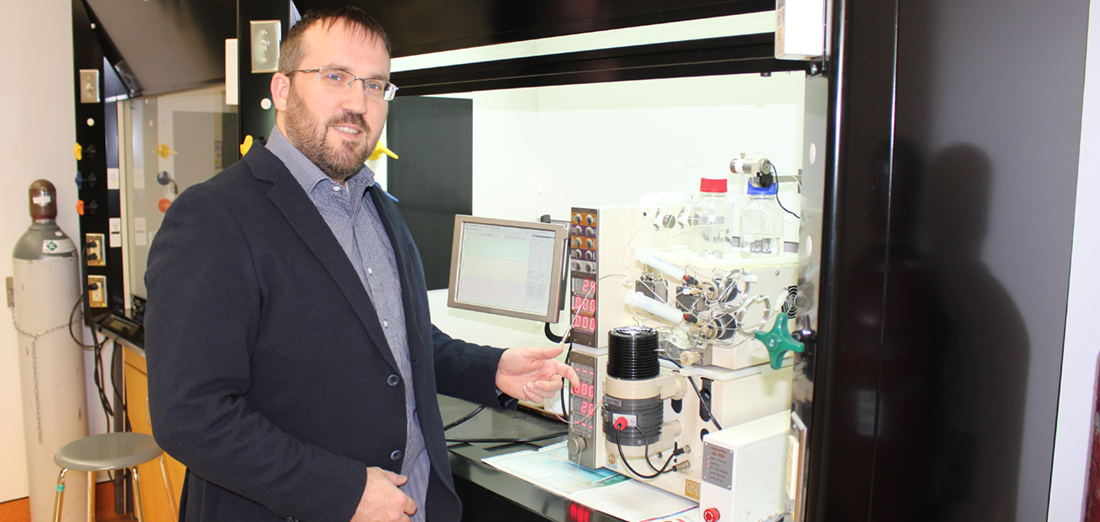
Restructuring molecules, improving health
Dr. Geoff Tranmer’s job is making good molecules better.
“The properties of any drug are due to the shape of the molecules – their essential structure,” explains the assistant professor in the College of Pharmacy. “Change the molecule and you change how the drug works.”
For Tranmer, that simple fact is at the heart of how we treat a complex disease: cancer.
Patients undergoing chemotherapy often experience a wide range of side effects, from nausea and vomiting to hair loss and fatigue. Some cancer drugs cause even more serious medical concerns, including neutropenia, an abnormally low number of a type of white blood cells that are vital to fighting off infection.
It’s a lot to take when you’re already facing a life-threatening disease, but at the moment, it’s the best science has to offer. Tranmer is trying to change all that.
“Some people respond poorly to certain drugs,” he says, purposely not naming the class of drugs he’s referring to because of a patent that is pending. “We’re taking existing treatments and trying to make them better.”
Making precise changes to the molecule of a drug causes it to behave differently in the body, allowing it to do its job better, with less potential harm or discomfort for the patient. Tranmer uses this process, called flow chemistry, to alter some of the key pharmaceuticals used in cancer treatment.
He offers a tour of his lab to help demystify the process. It has all the equipment you’d expect, from Erlenmeyer flasks and glass tubes to canisters of compressed gases and protective gear. At the end of an aisle in the sunny space is a medium-sized beige box covered in tubes and wires – a Vapourtec R2/R4 Flow Chemistry System.
Two syringes stick out of the front, with colourless liquids in red- and blue-capped containers mounted on top of the device. Digital numbers glow brightly on a display panel to the left. Pumps move a continuously flowing stream of fluids into a tube, where they meet and react.
Molecules are born.
For those who need a more familiar image to picture the complex interactions taking place on the molecular level, Tranmer suggests picturing a sewing machine. “We stitch together different atoms to form new bonds and new structures,” he says, describing the mechanics of the process. “It’s stitching them, then tailoring them – trying to make a perfect fit.”
Tranmer, who is from Lindsay, Ont., was educated at Brock University, the University of Guelph, Princeton University and the University of Cambridge. But he didn’t plan to work in academia.
He started his career in Montreal as a senior research chemist at the pharmaceutical company Merck-Frosst. He was a member of the technology enabled synthesis group, integrating the application of automated synthesis and purification into medicinal chemistry programs.
But then the company made some hard decisions that resulted in layoffs. “They said they were shutting it down,” Tranmer remembers. “They were letting go some of the world’s best scientists.”
Tranmer and his colleagues were shocked, but the company’s loss was academia’s gain. He changed direction and went on to work at McMaster University before joining the U of M in 2013.
The scientist says it’s been a good fit. “As an academic, I don’t have to cater to a drug company’s requests,” which in the private sector are necessarily market-focused and profit-driven. “I can direct my own research into helping or treating patients.”
For Tranmer, that’s what it’s all about. “I love doing the science, taking everything I know and using that to make new discoveries and new treatments,” he says. “If there’s a possibility to impact patients’ lives, that’s very rewarding.”






